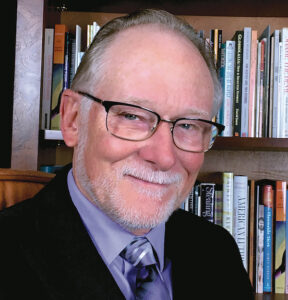
I arrived on campus in August of 1970 knowing nothing at all about Wake Forest except that it was where Arnold Palmer (’51, LL.D. ’70) had gone to college. I was not without a plan, however: I would major in journalism and play on the golf team. But after discovering that the school had no journalism major, and that I was woefully inadequate as a golfer, I didn’t quite know what to do with myself. In my campus wanderings, I happened across the old theatre, a homemade facility occupying the top two floors of the library. On a whim, I tried out for a play — Tom Stoppard’s existential classic “Rosencrantz and Guildenstern Are Dead.” I played a nameless Soldier who had four short lines of conversation with the character Hamlet.
Three years and 15 consecutive theatre productions later, I played the other side of that same conversation. Harold Tedford (P ’83, ’85, ’90), for whom the main stage in the Scales Fine Arts Center was later named, not only directed that production of “Hamlet,” he also played Claudius, the murderous usurper of the throne, and for years afterward we laughed at how much fun we’d had in our scenes together. He always mock-chided me for taking too much enjoyment in killing him in the final act.
Dr. T was family to me, as was our other director and acting teacher, the eternally kind Donald Wolfe, and Caroline Sandlin Fullerton, who taught us all not to talk like we had marbles in our mouths, and Marie Bagby (P ’74, ’77, ’83), the patient and ever-supportive administrative assistant who kept everything running smoothly. We students couldn’t help but return, show after show, so benevolent and protective was the atmosphere created by those four remarkable people.
But I also had a second home, a second family, in the English department, where it was my tremendous good fortune to enroll in two of the famed poetry classes of Ed Wilson (’43, P ’91, ’93) and two more taught by Elizabeth Phillips, plus the essay and short story courses offered by Bynum Shaw (’48, P ’75). The encouragement they gave me ultimately defined my path going forward.
After Wake, I spent a few years in New York City, acting and giving poetry readings in coffee houses and church basements around Greenwich Village. As my droll father once noted, “It’s OK if he doesn’t make it as an actor; he always has poetry to fall back on.” But even with two careers I couldn’t make ends meet — acting paid $45 a week, and the standard for poetry readings was 10% of the gate, which was usually about $3. I supplemented my income working as the bouncer at the Metropolitan Opera.
Eventually I came back to Wake to get my M.A. in English, and during that time I was lucky enough to become friends with the great poet and fellow Wake Forest grad A.R. Ammons (’49, D.Litt. ’72), who had returned to teach for a year. Archie was a great supporter of my writing, as was the wonderful and gifted Emily Herring Wilson (MA ’62, P ’91, ’93), co-founder of Jackpine Press, and those two became the mentors responsible for my first book of poems.
I didn’t quit acting right away — my final play at Wake was another Tom Stoppard gem, “Jumpers” — the first production directed by the brilliant James Dodding, who, like all the other Wake Forest giants I learned from, would himself go on to become something of an institution at the school.
Those English and theatre professors — along with others too numerous to mention here — taught me everything I know about teaching and about writing. But more importantly, they set a standard about how to behave in the world. Their generous and forgiving spirits became, for me, the essence of Wake Forest, and if, from time to time, I have done anything right over the past half century, all credit goes to them.
Clint McCown (’74, MA ’78) teaches in the MFA program at Virginia Commonwealth University. He has published 12 books, and his stories, essays and poems have appeared in more than 75 national journals and magazines. The Tennessee native is a two-time winner of the American Fiction Prize for his short stories. In 2021 he was inducted into the Wake Forest Writers Hall of Fame.


